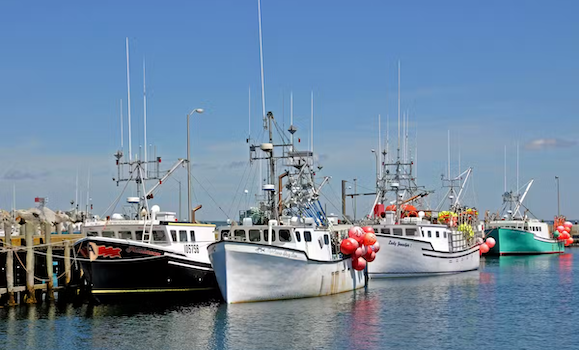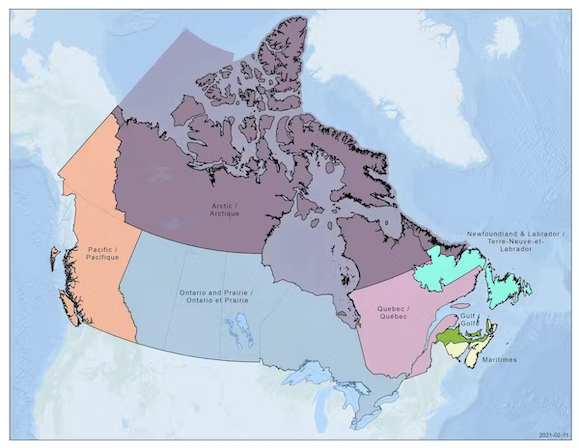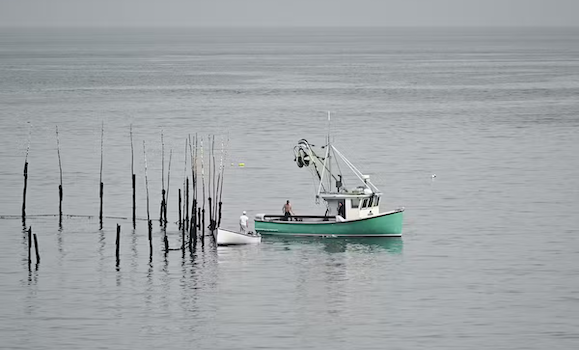About the authors:Ã˝Ã˝is an Associate Professor, Canada Research Chair, Integrated Ocean and Coastal Governance atÃ˝;Ã˝Ã˝is a Research Scientist at the Fisheries and Marine Institute atÃ˝; andÃ˝Ã˝is a Research Scientist at the Fisheries & Marine Institute atÃ˝.
During the federal election campaign, Canadian Prime Minister Mark Carney announced that if elected, he would look into restructuring . Carney stated that he understood the importance of DFO and of “."
Carney’s statement was made in response to protesting fish harvesters in Newfoundland and Labrador who decried recent DFO decision-making for multiple fisheries, including and .
Although addressing industry concerns is important, any change to DFO decision-making must serve the broader public interest, which includes commitments to reconciliation and conserving biodiversity.
Major reforms could fundamentally reshape fisheries science and management in Canada, yet most Canadians are unaware of how DFO’s science-management process works, or why change might be needed.
The DFO’s dual mandate
Ã˝
DFO has long been criticized for its dual mandate, which involves both supporting economic growth and conserving the environment.
For organizations like DFO to be trusted by the public, they need to produce information and policies that are credible, relevant and legitimate.
However, DFO’s dual mandates have been viewed as antithetical and have at the least created a . The issue at stake is how science advice from DFO can be considered independent, if it is also supposed to serve commercial interests.
One solution to this problem would be to shift control over the economic viability of fisheries to provinces. This is not a radical idea by any means, as most of the economic value of the fishery arises after fish are brought to harbour.

Fishing boats in the town of Clarke’s Harbour, located on Cape Sable Island, Nova Scotia in July 2011. ,
For example, licences to process groundfish like cod, haddock and halibut — — as well as policies governing the purchase of seafood already fall to provinces.
In 2024, all 13 ministers from the Canadian Council of Fisheries and Aquaculture Ministers indicated a desire for .
This was driven driven by a concern that the department has not focused enough on provincial and territorial fisheries issues. This shouldn’t be seen as a criticism of DFO, but rather an opportunity to embrace differentiated responsibility.
DFO could maintain regulatory control for fisheries, like enforcing the Fisheries Act, defining licence conditions and performing long-term monitoring and assessments. As included in the modernized Fisheries Act, it could still consider the .
Regional decision-making
Ã˝Ã˝
DFO is structured into regions with their own science and management branches, but many decisions end up being made by staff at DFO headquarters in Ottawa. In addition, the federal fisheries minister retains ministerial discretion for almost every decision, something that has been .
, a regional manager stated that they no longer make decisions:
“Because of…risk aversion, much more of the decision-making has now been bumped up to higher levels. So I like to facetiously state that I am no longer a manager, I am a recommender.”
Centralized decision-making can limit communication between regional scientists and managers and federal government policymakers.
This communication gap can make it difficult for managers to use the latest science and adjust policies quickly and it can also lead to recommended policies that are challenging to implement at the local level.
Handing management decision-making power to regional fisheries managers could therefore benefit science and policy, and contribute to decisions that are deemed more equitable by those impacted.

A map representing DFO’s regional structure.
Other countries use a regional management approach. In the United States, marine fisheries are managed by . Although not without their flaws, the .
Governance systems that have multiple but connected centres of decision-making are generally expected to be more .
This type of approach could shift the focus of Ottawa-based managers and the fisheries minister to ensuring national consistency.
Local stakeholder involvement
Ã˝Ã˝
Canada’s current methods for inclusion of social and economic considerations are limited and have produced scientific advice that .
Most of DFO’s scientific peer-review process is focused on ecological science conducted by DFO scientists. The peer-review process often also involves rights holders and stakeholders. , they often contribute to these meetings by describing their knowledge and experiences.
However, because the meetings are focused on DFO ecological science, they are not designed to formally consider stakeholder and rights holder knowledge. This can lead to two key issues. First, it may blur the line between peer-reviewed science and rights holder and stakeholder input, reducing the credibility of the scientific advice.
Second, the valuable information provided by rights holders and stakeholders may be overlooked since it is not shared in a setting designed to incorporate it.

Fishing boats in the Bay of Fundy next to Grand Manan island, New Brunswick on May 8, 2025.Ã˝THE CANADIAN PRESS/Graham Hughes
The lack of review of alternative Indigenous knowledge sources and social and economic science during peer-review processes inherently . It suggests that the government is not benefiting from the opportunity to .
These problems could be addressed by developing procedures through which stakeholders and rights holders contribute their local and traditional knowledge to better inform ecological and socio-economic considerations.
By increasing the number of peer-review platforms, rights holder and stakeholder input could be reviewed similarly to ecological science. This change would likely .
Regardless of how rights holders and stakeholders perspectives are included, the process should be .
By reconsidering DFO’s mandate, decentralizing management decision-making and improving the scientific consideration of varied forms of knowledge, DFO could make decisions that are closer to the wharf.![]()
This article is republished from under a Creative Commons license. Read the .

